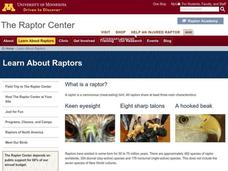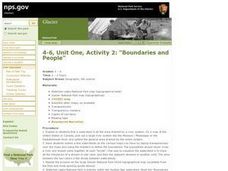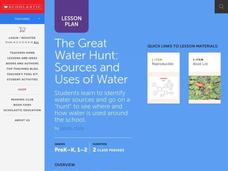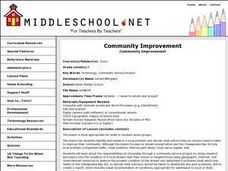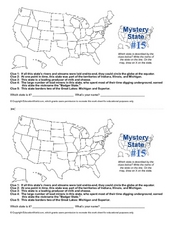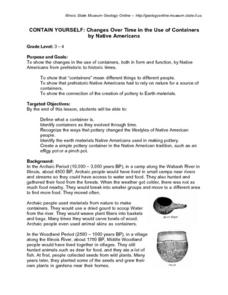Curated OER
Rock River Watershed
Students discover what a watershed is and which one they live in. Using the internet, they research why watersheds are important to an ecosystem and how to keep them from getting polluted. They use a map to locate various items within a...
Curated OER
River Study
Students study physical features of a local stream. They study how to identify water features on topographic maps.
Curated OER
Know Your Watershed
Students investigate the importance and the location of their own watershed by visiting and EPA website and also work in groups to create an action plan on how to protect their local watershed.
Curated OER
River Basin to Reservoirs: A Profile of the Kansas Republican River Basin and Reservoirs
Pupils examine the role the river played in the settlement of towns in the basin. Student groups prepare an oral presentation on Milford Lake, Tuttle Creek Lake or Perry Lake.
Curated OER
Michigan Quarter Reverse: A Coin Out of Water
Students examine the Michigan quarter reverse and differentiate between bodies of water. On copies of the quarter reverse, they color the land green and the water blue. After observing photos of water bodies, they complete a worksheet...
Curated OER
Sand Travels
Students examine how sand is formed by erosion and that it can be moved by streams, rivers, and ocean currents in this unit of lessons. They study waves and currents, and structures that change how sand moves by creating story charts,...
Curated OER
Boundaries and People
Students map watersheds to find their boundaries. In this watershed activity students map and then give their "watershed address." Students show the trail from stream, larger stream to oceans. Students describe the boundaries of the...
Curated OER
The Great Water Hunt
Students create a model of the land to water ratio in a large group and search for all the places water is used at their school while on a Great Water Hunt. They identify where water can be found and compare how much of world is covered...
Curated OER
Map of Pennsylvania's Waters
In this labeling bodies of water in Pennsylvania worksheet, students observe a map outline of the state with water sources and use the word bank of names of creeks, lakes, reservoirs, and rivers to identify them. Students label 21 bodies...
Curated OER
How To Find a Site
Fourth graders identify the three basic needs of humans. They identify on a map the best places to live and make a list of items that they can find on a map - streams, river, hills, plains, forests, etc.
Curated OER
Community Improvement
Students examine a local body of water to determinet the health of its ecosystem and monitor it during the year. If needed they write a report on any conditions that need improvement including photographs and relevant data.
Curated OER
Culmination of Mighty Waters
Third graders investigate the concept of bodies of water. The information is obtained from the internet while conducting research. Then students draw upon prior knowledge from a film to combine information for the purpose of creating a...
Curated OER
Traveling to Texas
First graders read "Where the River Begins" by Thomas Locker and discuss the Texan landscape. They use construction paper to make suitcases and then fill them with types of Texan landforms and scenery they might see on a trip to Texas.
Michigan Sea Grant
Exploring Watersheds
Collaboratively, students partake in a hands-on activity in which they build models of a watershed. Each group member draws an elevation map—a bird's eye view—of their model and predicts how water will flow from the high to low points....
Curated OER
Natural Features
Students identify natural features on a map. In this map skill lesson, students use a landscape picture map to identify mountains, hills, islands, lakes, and rivers. Students use post-it notes to demonstrate their location.
Curated OER
Water Table
Learners study the meaning of a water table and how it contributes to the existence of streams, swamps, and lakes in Nebraska. They conduct an experiment and complete a diagram of the hydrologic cycle.
Curated OER
Sediment Tubes
Students observe how different density soils and rocks behave in wind and in water. They make predictions and careful observations as they explore sediment transport and sediment rates in streams and rivers.
Curated OER
The Chesapeake Bay in Captain John Smith's Time
When Captain John Smith visited the Chesapeake Bay in the summer of 1608, what types of animals and habitats did he encounter? Your young historians will analyze primary source documents to answer this question, as well as compare the...
Curated OER
What's In A Name? British Surnames Derived from Places
Students study how British surnames were derived from locations. They observe that some of the more common names are still prevalent today.
Curated OER
Any Day Can Be Earth Day
You can make the spirit of Earth Day last year round with these long-term projects.
Hands On Network
Passion into Action
Find your passion. Find service opportunities. Decide how to serve. An instructional packet offers step-by-step directions for getting involved in community service. The practical suggestions and helpful worksheets make what may seem to...
Curated OER
Mystery State #15
Do you know the name of the Badger State? Using five fantastic clues, your super sleuths will determine the name of mystery state number 15. A wonderful way to warm up the class!
Curated OER
Contain Yourself: Changes Over Time in the Use of Containers by Native Americans
Young scholars investigate how Native American containers changed over time and how the use of pottery changed their lifestyle. They create a pottery container.
Curated OER
Winter Olympics Vocabulary
In this Winter Olympics vocabulary skills learning exercise, learners match the 12 Olympics-related terms in the word bank to the appropriate definitions.
Other popular searches
- Streams and Rivers
- Create Rivers and Streams
- Rivers and Streams Fl
- Rivers and Streams Lab
- Rivers and Streams Biomes
- Streams Rivers
- Rivers and Streams Bio Mes



